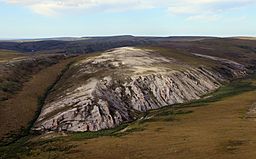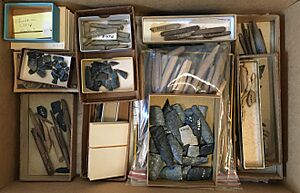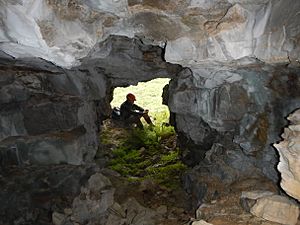Trail Creek Caves facts for kids
Quick facts for kids Trail Creek Caves |
|
|---|---|

Aerial view of the Trail Creek Caves Site on Alaska’s Seward Peninsula.
|
|
| Discovery | 1928 |
| Geology | limestone |
| Entrances | 12 |
The Trail Creek Caves are a group of twelve caves located in Alaska, within the Bering Land Bridge National Preserve. These caves are very important because scientists have found many ancient objects there. These objects include stone tools and pieces of bone. They show that people lived in this area more than 8,500 years ago.
The caves were first found in 1928 by two local people, Taylor Moto and Alfred Karmun, from Deering, Alaska. A scientist named David Hopkins checked the site in 1948. Later, a Danish archeologist named Helge Larsen led the first big dig here from 1949 to 1950. The caves are found along Trail Creek, close to where it meets Cottonwood Creek.
Discovering Ancient Life
The Trail Creek Caves are a special place for learning about early people in Alaska. Archeologists study the objects found here to understand how ancient hunters lived. These findings help us piece together the story of the first people who came to North America.
What Was Found?
During the excavations, scientists found many interesting things. They uncovered tools made of stone, which ancient people used for hunting and daily tasks. They also found bone fragments. These items give clues about the animals hunted and the way of life thousands of years ago.
The Story of an Ancient Child
In 2018, scientists made an exciting discovery from a tooth found in Trail Creek Cave 2. This tooth was dug up back in 1949. It belonged to a young child who lived about 9,000 years ago.
Scientists were able to study the child's genome, which is like a blueprint of their DNA. This study helped them learn more about the child's family history. The child's DNA was similar to another ancient person found at a place called the Upward Sun River site. This suggests they were part of a very old group of people called the Ancient Beringians.
This discovery is important because it helps scientists understand how people moved across the land bridge from Asia to North America long ago. It gives us a clearer picture of the first groups of people who settled in Alaska.
 | Laphonza Butler |
 | Daisy Bates |
 | Elizabeth Piper Ensley |



